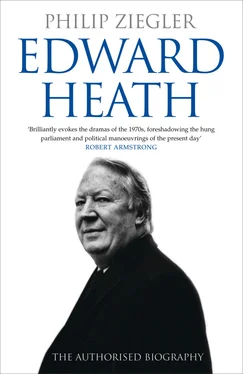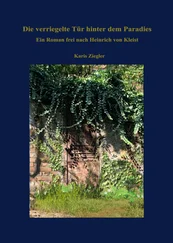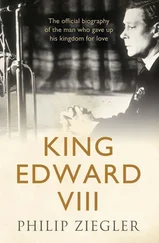The same was true when he looked to business and industry. ‘At the moment I have six irons in the fire; two of them certainties if I want them and I hope to get them sorted out this month,’ he told a friend in November 1946. One of the certainties was ICI, but when Heath told them that he hoped to be standing for parliament at the next election the certainty became unstuck and he was told he could not be considered. Another certainty or near-certainty was the North Central Wagon and Finance Company. This job would have carried with it alluring prospects of promotion to chairman within three years, but though this would have been lucrative it would have involved a move to Rotherham, unacceptably far from the political power centre. Unilever seemed more promising but here there appears to have been some misunderstanding. Heath thought that they were not disturbed by his wish to enter parliament, but the report on his application said that he had abandoned his political ideas without regret: ‘Provided he really can subordinate his interests in politics as a career, I believe he would be very well suited to business.’ The man who interviewed him could hardly have been more flattering. Heath, he said, was ‘one of those rare men who is extremely competent intellectually yet a normal, pleasant, honest person…I found him very likeable’. Under the heading ‘Quality of Social Relations’ the interviewer said: ‘I rate this man very high. He strikes me as a well-balanced, human sort of person whom others would willingly work for and with.’ He was offered a management traineeship. Possibly the true position about his political ambitions now came to light; certainly he turned the offer down. 4
There remained the civil service. Heath knew that if he became a parliamentary candidate he would not be able to continue to work in Whitehall but that he would be free to pursue his career until that point was reached. If he never succeeded in finding a winnable seat he would at least have a respectable profession on which to fall back; if he did escape to politics he would have gained valuable experience of the workings of the civil service. He appeared before the Final Selection Board in August 1947. Just over 200 applicants survived to face this ultimate hurdle. Twenty-two passed in, and of these Heath was top. With this glittering success he could reasonably have expected to be able to choose his department. He was told that the Foreign Office was his for the asking (whether the Foreign Office had been consulted over this is unclear; they were a law unto themselves when it came to selecting future diplomats). The idea was appealing in many ways, but Heath realised that the long periods of exile which the career would involve would be incompatible or at least hard to reconcile with a move into politics. His wish was to join the Treasury, which he felt carried the greatest prestige and wielded power over all the Whitehall departments. Peter Masefield, his eventual boss in the civil service, thought that possibly his avowed political ambitions, though no bar to entry into the civil service, counted against him when it came to the choice of a department. Heath openly admitted that his main concern was to gain experience which would be of use to him when an MP; to the Treasury this may have seemed lèse-majesté . Whatever the reason, to his chagrin he was consigned to the fledgling Ministry of Civil Aviation. His first task was to work with the future Dame Alison Munro, deciding which of the 700 mainly grass airfields dotted around the country should be retained for future development. Heath was responsible for the airfields near London, Alison Munro for the rest of the United Kingdom. 5
Soon he found himself working almost exclusively to the head of the Long-Range Planning Department, Peter Masefield. Masefield was a man of enterprise and imagination, a temporary civil servant who, in a couple of years, was to move on to take charge of British European Airways. Masefield took to Heath, pronouncing him ‘pleasant, sound and highly intelligent…And, with all, when you get to know him (which isn’t easy) he is a sensitive and warm-hearted chap who has a direct approach and an endearing sense of the ridiculous.’ Heath quickly found himself with a finger in a wide range of pies, from the development of the Comet to the planning of Heathrow (a name for which he accepted no responsibility). This last task was particularly stressful. ‘Every time I arrive at Heathrow,’ he wrote in his memoirs, ‘I shudder to think that I was in any way involved in the creation of that monstrosity.’ But for his efforts, it might have been more monstrous still. The first plans provided for no parking areas and no aircraft piers to avoid the need for buses. Heath championed both causes and won the day. ‘He used to go and fight on the committee,’ Masefield remembered, ‘and come back and cry on my shoulder about all the spokes put in the wheel by bumbledom.’ 6Another achievement with which Masefield credited him was persuading de Havillands, when the Comet was in the final stages of development, to substitute four-wheel undercarriage legs for the two-wheel version which they had been proposing to use. The ‘Heath modification’, as Masefield called it, made it possible for the Comet to land on many runways which would otherwise have been too weak to support the impact. ‘That change’, Masefield told Heath many years later, ‘enabled 77 Comets to be produced and used throughout the world.’ 7
Masefield quickly recognised that Heath was an invaluable member of his team. ‘But I fear I shall not have him here for long’, he wrote regretfully, ‘because, outside the office, he lives and dreams politics.’ 8He was right. Heath’s first move was to try for a job in the Conservative Research Department, a body which, under Rab Butler, was busily rebuilding a new and more progressive Tory Party from the ruins left by the 1945 election. He knew that several of the cleverest and most ambitious of the young Conservatives – Iain Macleod, Enoch Powell, Reginald Maudling – were already at work there; he longed to be doing the same thing himself and was uneasily conscious of the fact that they were snatching a lead over him in the race up the greasy pole of political advancement. Michael Fraser, a wartime friend, was another rising star in the department; Heath appealed to him but was told there was no vacancy or any prospect of one in the near future. By then he was already embarked on the road which he knew he would one day have to travel: the quest for a constituency. Early in 1947 he added his name to the approved list of prospective candidates held by Central Office. He had high hopes that, with his talents and qualifications, he would quickly be selected. By the standards of some would-be candidates he did indeed have a relatively easy passage, but he still suffered some disconcerting setbacks along the way.
The first constituency to summon him for an interview was Ashford, in Kent. It went well, but when it came to the final selection the chairman said that they wanted a member who would apply himself wholeheartedly to the needs of the constituency. Would Heath promise that, if he was offered a job in any forthcoming Conservative government, he would turn it down? Heath would give no such undertaking; for him the main point of being in the House of Commons was the prospect it offered of serving in the government. Ashford rejected him, in favour of the Daily Telegraph journalist Bill Deedes. Deedes later said that he had been selected for the seat because he wore a tweed jacket for his interview while Heath wore a city suit. To this Heath retorted that, at the time, he didn’t even own a city suit. 9There may nevertheless have been something in what Deedes said. Though the reformers might be busily at work in London, in the shires the Tory Party was still a highly traditional if not reactionary body. The selectors in a largely rural constituency like Ashford would have wished their member, if not actually drawn from the landed gentry, at least to look and sound as if he were. Heath, with his suspect accent and unabashed lower-middle-class origins, was far from this ideal. The fact that he got through to the final round shows that any such prejudice was not held too seriously, but there could well have been an element of snobbishness in the final selection.
Читать дальше












